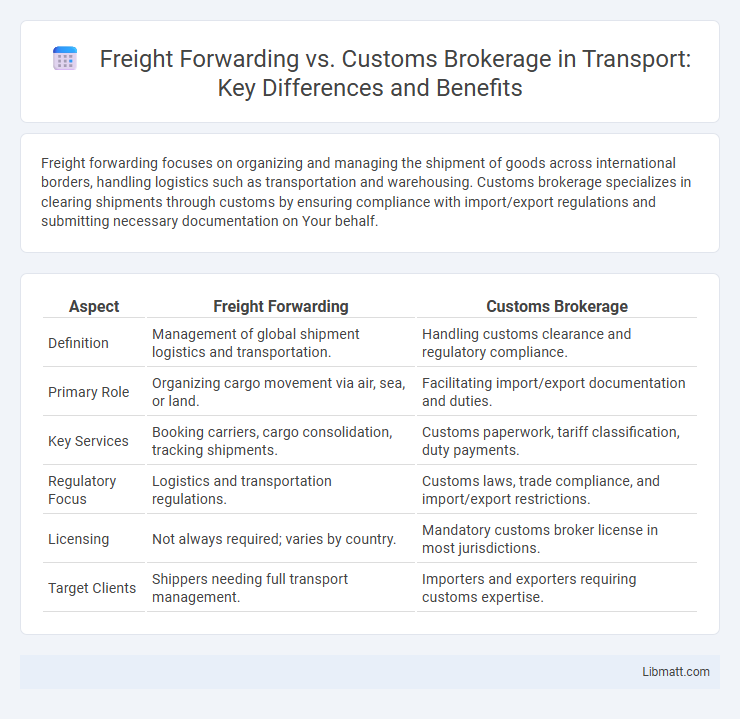Freight forwarding focuses on organizing and managing the shipment of goods across international borders, handling logistics such as transportation and warehousing. Customs brokerage specializes in clearing shipments through customs by ensuring compliance with import/export regulations and submitting necessary documentation on Your behalf.
Table of Comparison
| Aspect | Freight Forwarding | Customs Brokerage |
|---|---|---|
| Definition | Management of global shipment logistics and transportation. | Handling customs clearance and regulatory compliance. |
| Primary Role | Organizing cargo movement via air, sea, or land. | Facilitating import/export documentation and duties. |
| Key Services | Booking carriers, cargo consolidation, tracking shipments. | Customs paperwork, tariff classification, duty payments. |
| Regulatory Focus | Logistics and transportation regulations. | Customs laws, trade compliance, and import/export restrictions. |
| Licensing | Not always required; varies by country. | Mandatory customs broker license in most jurisdictions. |
| Target Clients | Shippers needing full transport management. | Importers and exporters requiring customs expertise. |
Introduction to Freight Forwarding and Customs Brokerage
Freight forwarding involves coordinating the movement of goods across international borders, including arranging transportation and managing logistics to ensure timely delivery. Customs brokerage focuses on clearing shipments through customs by handling import/export regulations, documentation, and duties compliance. Understanding the roles of freight forwarding and customs brokerage helps you optimize shipping processes and avoid delays in global trade.
Key Differences Between Freight Forwarding and Customs Brokerage
Freight forwarding involves managing the logistics of transporting goods across international borders, including arranging shipping, warehousing, and delivery, while customs brokerage specializes in ensuring compliance with customs regulations and facilitating the clearance of shipments through customs authorities. Your choice between freight forwarding and customs brokerage depends on whether you need comprehensive supply chain management or expert assistance with regulatory documentation and duties. Understanding these roles helps optimize your global shipping strategy and avoid delays or penalties.
Roles and Responsibilities of Freight Forwarders
Freight forwarders coordinate the transportation of goods across international borders by managing logistics, booking cargo space, and arranging shipments via air, sea, or land. Their responsibilities include preparing necessary shipping documentation, tracking cargo status, and ensuring timely delivery. By handling complex logistics, freight forwarders simplify your global supply chain and optimize the movement of goods from origin to destination.
Duties of Customs Brokers Explained
Customs brokers specialize in ensuring your shipments comply with all import and export regulations by preparing and submitting necessary documentation to customs authorities. Their duties include calculating tariffs, duties, and taxes accurately while facilitating the smooth clearance of goods through customs to avoid delays or penalties. Unlike freight forwarders who manage the logistics of transportation, customs brokers focus specifically on regulatory compliance and legal requirements.
How Freight Forwarders Facilitate Global Trade
Freight forwarders coordinate the complex logistics of international shipping by arranging transportation, handling documentation, and ensuring compliance with global trade regulations to streamline cargo movement across borders. They act as intermediaries between exporters, importers, and carriers, optimizing routes and consolidating shipments to reduce costs and transit times. Unlike customs brokers who specialize in customs clearance, freight forwarders provide end-to-end supply chain solutions that facilitate efficient global trade operations.
The Customs Clearance Process: Broker’s Perspective
Customs brokers streamline the customs clearance process by meticulously preparing and submitting required documentation, including import/export declarations, tariffs, and compliance forms, ensuring adherence to regulatory standards. Their expertise in tariff classification and duty payment calculation minimizes delays and penalties, facilitating swift cargo release. By liaising directly with customs authorities and utilizing automated systems, brokers expedite clearance, reduce risk of shipment holds, and optimize overall supply chain efficiency.
Regulatory Compliance: Freight Forwarders vs. Customs Brokers
Freight forwarders manage logistics by coordinating the shipment of goods, ensuring compliance with transportation regulations, while customs brokers specialize in navigating complex customs laws to facilitate the legal entry and exit of goods through borders. Customs brokers possess in-depth knowledge of tariff classifications, import/export restrictions, and duty payments, ensuring adherence to customs regulations and preventing legal penalties. Freight forwarders rely on customs brokers to handle regulatory compliance related to border clearance, allowing them to focus on optimizing shipment routes and transportation efficiency.
Choosing the Right Service: Forwarder, Broker, or Both?
Choosing the right service depends on your logistics needs: freight forwarders handle the transportation and coordination of goods across borders, while customs brokers specialize in ensuring compliance with import/export regulations and clearing shipments through customs. For complex international shipments requiring regulatory expertise and seamless transit management, using both services together optimizes efficiency and reduces delays. Businesses focused on streamlined global trade benefit from integrating freight forwarding with professional customs brokerage to safeguard compliance and expedite delivery.
Costs and Fees: Freight Forwarding vs. Customs Brokerage
Freight forwarding typically involves consolidated fees covering transportation, documentation, and handling, often resulting in cost savings for complex shipments. Customs brokerage fees are centered on compliance, including duties, tariffs, and import/export clearance, with charges varying based on shipment value and complexity. Understanding the distinct cost structures helps businesses optimize international shipping expenses by balancing forwarding logistics and regulatory requirements.
Conclusion: Which Service Does Your Business Need?
Freight forwarding and customs brokerage serve distinct roles in international trade, with freight forwarders managing shipment logistics and customs brokers ensuring regulatory compliance. Businesses engaged in global shipping benefit from freight forwarding services to coordinate transportation, while customs brokerage is essential for navigating import/export customs regulations and duties. Choosing the right service depends on whether your primary need is logistical coordination or expert handling of customs clearance.
freight forwarding vs customs brokerage Infographic

 libmatt.com
libmatt.com